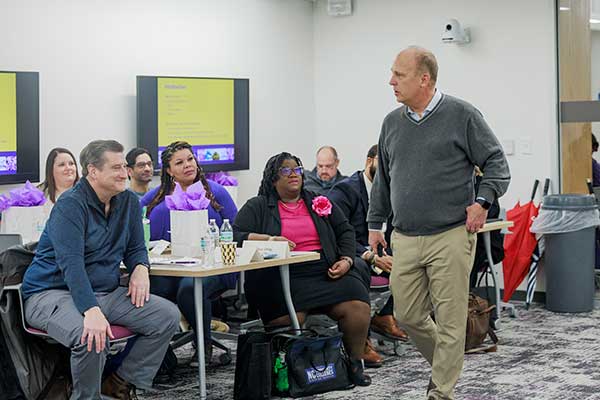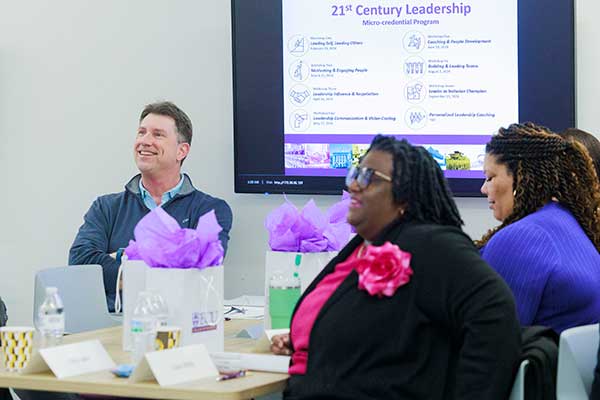ECU delivers leadership skills for the individual, the region
East Carolina University’s College of Business Office of Expert Services debuted its 21st century Leadership Series on Feb. 23. The non-curricular, learning workshops will provide 17 participants with opportunities to grow their leadership skills with the tools needed to lead employees and their companies strategically.
Over the next seven months, workshops will include lectures, case studies and opportunities for participants to apply what they’ve learned to their circumstances and challenges as a leader.

Dr. Andy Herdman, of the College of Business Office of Expert Services, kicks off workshop No. 1 of the 21st Century Leadership series, a microcredentialed program that focuses on helping individuals build their leadership capabilities.
The Office of Expert Services (OES) launched in November. It is designed to work with eastern North Carolina businesses and their leadership to ensure organizations remain relative and dynamic in North Carolina’s economic landscape.
The leadership series is the first microcredential opportunity to be launched through ECU’s new microcredential approval process and is offered through the ECU Office of Continuing and Professional Education. The seven-course series focuses on developing critical capabilities that help participants grow as leaders. Those capabilities include:
- Self-leadership
- Communication and vision-casting
- Influence and negotiation
- Coaching and people development
- Motivating and engaging people
- Leading teams
- Building an inclusive culture
The participants bring a broad spectrum of backgrounds and perspectives and come from numerous private and public organizations from counties surrounding Greenville.
“I was happy to see the attendees had a general thirst to meet with like people and talk about common challenges, their shared experiences,” said Dr. Andy Herdman, organizer of the series. “The energy found in the room helped kick things off on a strong note.”
Herdman said the participants have a strong sense of awareness; they know how to recognize challenging issues, are willing to learn and then act on what they learned.
“Each workshop will cover one or two leadership topics that will allow the participants to apply to their personal and business lives,” said Herdman. “The plan is to give them the understanding and tools they can implement the day they walk out of each workshop.”
Personal Transformation

17 participants will participate in a seven-month leadership series of workshops that will include personal coaching from the presenters.
“The lesson plan subjects are on target for what I feel I need to grow in 2024,” said Waightstill “Wade” Morehead Scales IV of Sound Partners, a financial advising firm in Greenville.”
Scales and one of his business partners are participating in the workshop for several reasons, e.g., “understanding how to best set a vision/course” that will benefit his company. Additionally, he has previously participated in workshops conducted by Herdman.
“His ability to relate to his students, show sincere interest in me and my success, and give me practical and focused action steps toward achievement made this class a no-brainer,” said Scales.
Like Herdman, he looks forward to being among other professionals with varying backgrounds.
“I’m excited to … learn from the other participants in the cohort,” said Scales. “Our group’s diversity of experience, race, gender, industry, history, etc., coupled with how open and honest we were with each other right off the bat in that very first meeting, was infectious.”
Rachel Whitten is the vice president of sales and services at Visit Greenville, North Carolina. After graduating with a business degree (with a marketing concentration) from ECU in 2002, she continued her lifelong pursuit of education by obtaining a level 1 Cicerone certification, graduating from a Lean Six Sigma Champions Course, and earning her certified Meeting Professional (CMP) credentials. Annually, she attends at least 35-40 hours of continuing education and professional development through industry associations and events.
She’s not done.
“(The 21st-century leadership) program description offered a more comprehensive, in-depth study of the tools and skills needed to excel in a leadership role in the 2020s,” said Whitten. “By attending these workshops, I’m hoping to refine the leadership skills I have learned so far in my career … and let go of any (skills) that no longer belong or serve me and the teams I lead.”
Regional Transformation
“We want to position the university’s microcredential portfolio in a way that’s going to be relevant and competitive for industry as well as adult learners interested in gaining new skills or sharpening existing ones that will make them more competitive as applicants and more valuable as employees,” said Sharon Paynter, ECU’s acting chief research and engagement officer. “Doing this will help ensure there is a strong workforce pipeline to support business and industry in eastern North Carolina, as well as other places.”
Paynter oversees ECU’s Office of Research, Economic Development and Engagement, which includes the office of continuing and professional education. Its role is to administer and lead the microcredential programs, which includes a review process and committee that assesses variables like market needs and the university’s capacity to meet them.
“Microcredentials are designed to be nimble and quick, often faster to complete than a traditional academic degree or certificate program,” said Paynter. “(It gives) learners the opportunity to sharpen or add skills that will make them more competitive in a workforce environment.”
“Andy started the meeting with a strong statement ‘that more so than other areas in the country, eastern North Carolina will thrive or fail based on the abilities of our leaders,’” said Scales. “The 21st-century Leadership Series is ECU, once again, planting a flag and doubling down for our region.”
The group will meet one Friday a month between April and Sept. 24. Upon completion of the series, attendees will receive personalized coaching and a digital badge that they can use to show their new skill set.